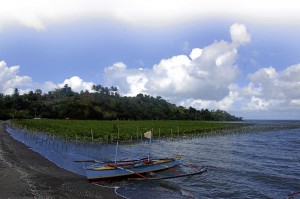CAGAYAN DE ORO CITY—Police were sent to prevent the return of poor families to a community here that suffered heavily from the Dec. 17 disaster that struck this city and Iligan City and which had been declared no man’s land.
Cagayan de Oro Rep. Rufus Rodriguez said police were sent to Isla de Oro, a sandbar that once hosted 10,000 people but was emptied when the disaster erased entire communities from the map and killed nearly 2,000 people in the two Northern Mindanao cities.
The congressman said two teams of police from the Cagayan de Oro City Public Safety Company are to take turns in guarding for 24 hours the entrance to the sandbar at the mouth of the Cagayan River.
Isla de Oro has been declared a no habitation zone by the Mines and Geosciences Bureau (MGB) after the Dec. 17 disaster at the height of Tropical Storm “Sendong” brought up to 30-feet deep floods that swallowed homes and killer logs that crushed people to their deaths.
Shanties built on the sandbar were washed out to sea, with many of their occupants on Dec. 17.
The city’s water and power utility firms removed services from the sandbar to discourage people from returning to their washed out community.
The Cagayan de Oro City Water District removed pipes connecting Isla de Oro to its main distribution lines while the Cagayan Electric Power and Light Company Inc. uprooted electric posts and cut power lines to the sandbar.
Allowing people to return to Isla de Oro, said Rodriguez, was like “courting disaster.”
“Let’s obey the government,” said the congressman. “It’s for your safety. The government is looking after your safety, so please let’s not return,” he said, recalling what he told residents when he came to visit the sandbar recently.
The residents were allowed to return to Isla de Oro only to retrieve whatever remained of their belongings.
Rodriguez said the river will be widened to prevent floods of the same magnitude as that which struck the city on Dec. 17.
He said soil would be removed from the riverbed and dumped on its banks to prevent water from flowing into the city during heavy rains.
Residents would still be allowed to enter the area for brief visits, said Rodriguez.
He said he was planning to build a memorial there, where people can converge while visiting the island.
“There must be a common ground for them,” Rodriguez said. Bobby Lagsa, Inquirer Mindanao


